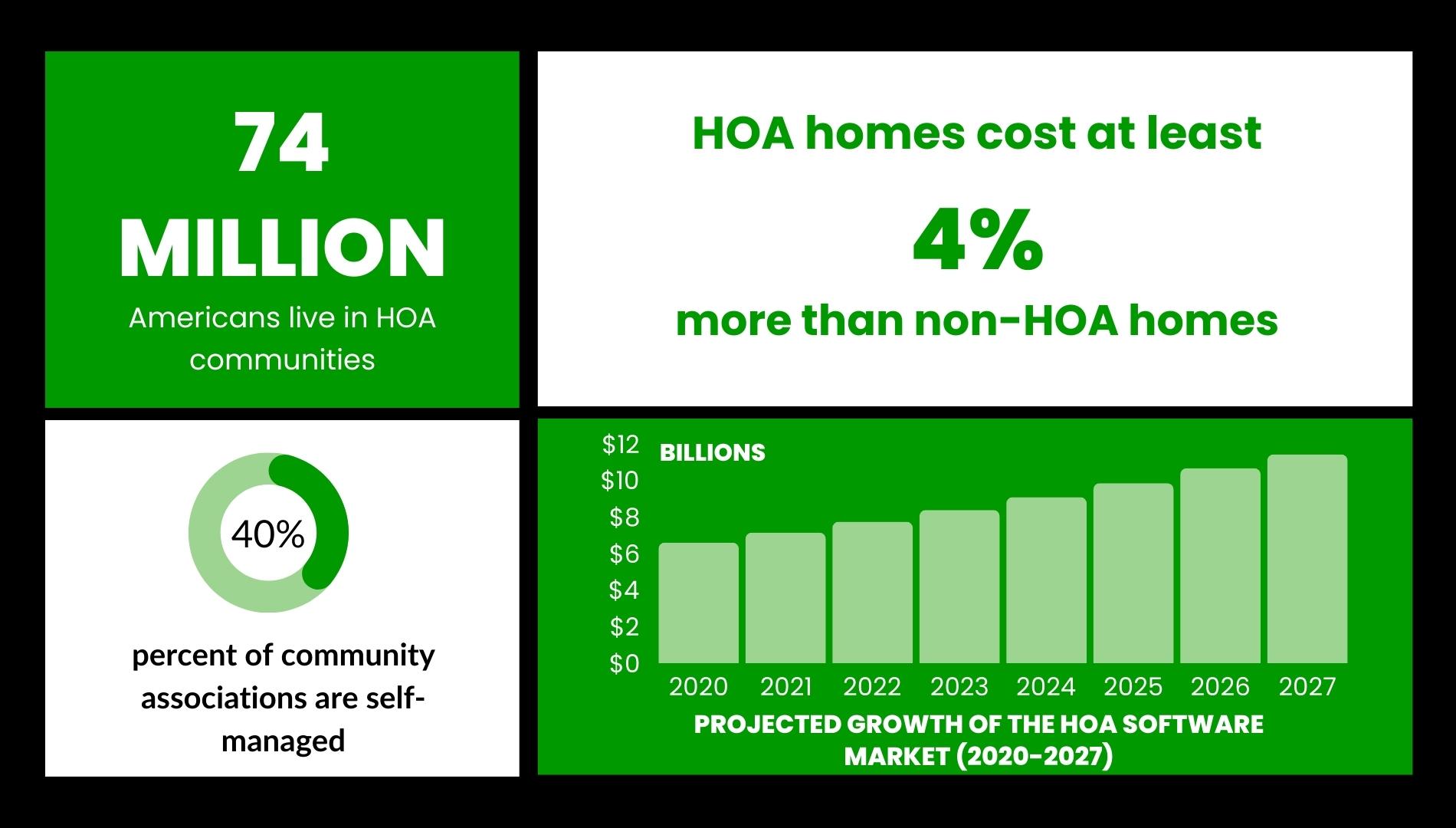Homeowners Associations (HOAs) are organizations in residential communities that make and enforce rules for the properties and their residents. The primary purpose of an HOA is to maintain and increase property values by ensuring that community standards are upheld. This includes managing common areas, enforcing community rules, and sometimes providing amenities and services to enhance the quality of life for residents.
Why Are HOAs So Popular?
The popularity of HOAs has grown due to the appeal of community living with managed amenities and services, as well as the desire to protect property values through community standards. The combined property value of homes within HOA communities in the U.S. reached a staggering $11 trillion as of 2021
Properties in an HOA sell for 5-6% more on average than similar homes not part of an HOA, according to a study at George Mason University making them a popular choice.
What Are the Advantages and Disadvantages of HOAs?
Advantages include:
- Maintaining and potentially increasing property values.
- Providing access to amenities and services.
- Fostering community engagement and a sense of belonging.
Disadvantages include:
- Additional fees which can impact affordability.
- Restrictions on property use and appearance.
- Potential for conflict and management issues within the community.
Why Do HOAs Have So Much Power?
The power of HOAs stems from their ability to enforce the community’s covenants, conditions, and restrictions (CC&Rs). These powers can include imposing fines, placing liens on properties, and in extreme cases, foreclosing on a home for non-compliance or non-payment of dues. This authority ensures that community standards are maintained, directly impacting property values and the living environment.
The power of HOAs can be likened to that of small local governments, wielding considerable influence over their communities. This authority is derived from their ability to enforce CC&Rs, with powers that can extend to imposing fines, placing liens on properties, and in some cases, foreclosing on homes for dues delinquency or non-compliance. Such powers ensure the maintenance of community standards, significantly impacting property values and the overall living environment.
What Powers Do HOAs Have?
HOAs can enforce community rules, maintain common areas, manage community finances, and, if necessary, take legal action against non-compliant homeowners. These powers are essential for preserving the community's integrity and operational efficiency.
What Can a Homeowners Association Do to You?
The authority wielded by a Homeowners Association (HOA) over its community members can be profound, impacting everything from the exterior paint color of your home to the landscaping of your front yard. Understanding the extent of an HOA's power is crucial for both current and prospective members. Here's a deeper look at the actions an HOA can take:
- Impose Fines: For violations of the community's covenants, conditions, and restrictions (CC&Rs), an HOA can levy fines against homeowners. These fines are intended as a deterrent against rule violations and can vary in amount depending on the severity of the infraction and the HOA's specific policies.
- Place Liens Against Your Property: If fines go unpaid or homeowners fall behind on their regular HOA dues, the association has the right to place a lien on the property. A lien is a legal claim against a property for the amount owed, and it can complicate the sale or refinancing of the home until the debt is settled.
- Foreclosure: In severe cases, particularly when homeowners fail to pay their dues or fines over an extended period, an HOA may have the right to foreclose on the property. This process allows the HOA to take ownership of the property in order to recoup the unpaid dues or fines. Foreclosure laws vary by state, and in some locations, HOAs can foreclose on a property without going through a court process.
- Regulate Property Use and Appearance: Beyond financial penalties, HOAs regulate how properties within the community can be used and what they can look like. This can include restrictions on paint colors, types of fencing, landscaping requirements, and the prohibition of certain types of vehicles or commercial activities.
- Control Over Common Areas and Amenities: HOAs manage and maintain the community's common areas and amenities, such as pools, clubhouses, and green spaces. They can establish rules regarding the use of these areas, including hours of operation, guest policies, and conduct requirements.
- Mediate Disputes: In communities with HOAs, the association often acts as a mediator in disputes between neighbors over property lines, noise complaints, and other issues that may arise, providing a structured way to resolve conflicts.
- Amend Rules and Regulations: HOAs have the authority to amend existing rules and create new ones as needed, allowing them to adapt to changing circumstances within the community. These changes can impact how residents use their property and the common areas.
While the powers of an HOA can seem daunting, they are generally established with the intention of maintaining the quality, safety, and value of the community for all residents. It's essential for homeowners to stay informed about their HOA's rules and regulations, participate in association meetings, and vote on important issues to ensure their community remains a desirable place to live.
What Are Common HOA Rules?
HOA rules can cover a wide range of aspects, including property maintenance standards, noise restrictions, pet policies, and use of common areas. These rules are designed to maintain the community's appearance and livability.
How to Get Out of an HOA?
Getting out of an HOA is difficult, as membership is typically tied to owning property in the community. Options include selling your property or, in rare cases, legally challenging the HOA or advocating for its dissolution.
What Are the Legal Responsibilities of an HOA?
Legal responsibilities include maintaining common areas, managing finances responsibly, enforcing rules fairly, and ensuring compliance with federal, state, and local laws.
Who Governs HOAs in Arizona?
While the Arizona Department of Real Estate (ADRE) provides resources and dispute resolution services for HOA issues, direct regulation is somewhat limited. Each HOA is generally self-governed by a board of directors elected by the homeowners.
Who Regulates HOAs in Florida?
In Florida, the Florida Department of Business and Professional Regulation (DBPR) oversees HOAs, offering resources for dispute resolution and ensuring that associations comply with state law.
What Laws Govern HOAs?
HOA laws vary by state but typically outline the powers and duties of the association, the rights of homeowners, and specific requirements for financial management, governance, and dispute resolution.
Understanding the complexities of living within an HOA-governed community is crucial for homeowners and prospective buyers. While HOAs play a significant role in maintaining community standards and enhancing property values, they also come with specific obligations and restrictions for residents.
- Tony Mariotti. (2024, March 27). HOA Stats: Average HOA Fees & Number of HOAs by State. RubyHome. https://www.rubyhome.com/blog/hoa-stats/
- DoorLoop. (2024, March 25). 50+ HOA Statistics: Average HOA Fees & Number of HOAs by State. https://www.doorloop.com/blog/hoa-statistics
- iPropertyManagement. (2022, October 9). HOA Statistics [2024]: Average HOA Fees + Number of HOAs. https://ipropertymanagement.com/research/hoa-statistics







